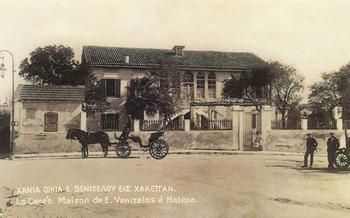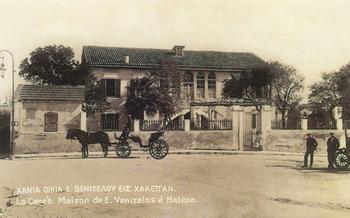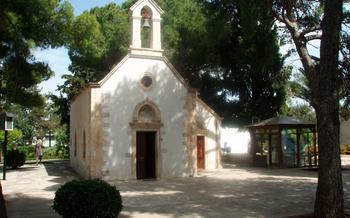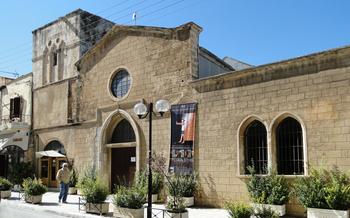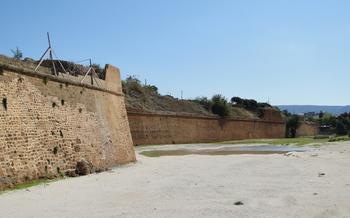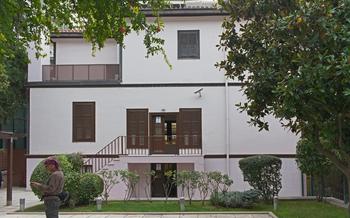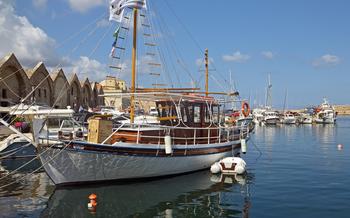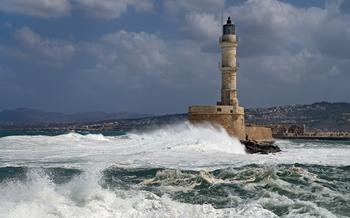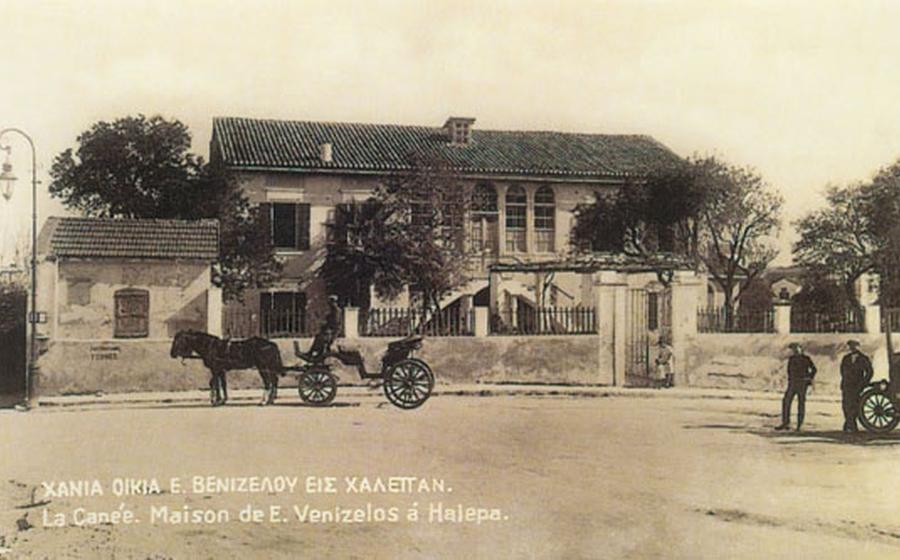
The House Museum of Eleftherios Venizelos
- The House Museum of Eleftherios Venizelos
- A Journey into the Past: Exploring the Historical Significance
- Architectural Charm: Admiring the Neoclassical Elegance
- Stepping into Venizelos's World: Personal Belongings and Memorabilia
- The Cretan Connection: Exploring Venizelos's Ties to Crete
- Political Achievements: Uncovering Venizelos's Legacy
- Wartime Leadership: Navigating Greece through Turbulent Times
- Controversies and Adversaries: Examining Venizelos's Challenges
- International Recognition: Venizelos on the Global Stage
- Guided Tours and Educational Programs: Unveiling the Museum's Treasures
- Museum Shop: Discovering Unique Souvenirs and Publications
- Accessibility Information: Ensuring an Inclusive Experience
- Photography and Social Media: Capturing and Sharing Your Experience
- Nearby Attractions: Exploring Chania's Cultural Treasures
The House Museum of Eleftherios Venizelos
Eleftherios Venizelos, widely regarded as one of Greece's most prominent and influential statesmen, played a pivotal role in shaping the nation's modern history. His legacy continues to inspire and intrigue, drawing visitors from around the world to the House Museum of Eleftherios Venizelos in Chania, Crete.
The museum is housed in the former residence of Venizelos, a stately neoclassical mansion located in the heart of Chania's historic district. Built in the late 19th century, the building exudes an air of grandeur and elegance, reflecting the refined taste and sophistication of its former occupant.
Location and accessibility: The museum is situated at 76 Halidon Street, in the picturesque district of Halepa, just a short walk from the center of Chania. It is easily accessible by foot, bicycle, or public transportation, making it a convenient destination for both tourists and locals alike.
A Journey into the Past: Exploring the Historical Significance
The House Museum of Eleftherios Venizelos is not just a repository of artifacts; it is a time capsule that transports visitors back to a crucial era in Greece's history. Venizelos's life and career were intertwined with the nation's struggle for independence, modernization, and international recognition. Through his political acumen and unwavering dedication, he played a pivotal role in shaping Greece's destiny.
The museum serves as a testament to Venizelos's remarkable contributions. It houses a treasure trove of historical artifacts, including personal belongings, official documents, and photographs that provide a glimpse into his life and work. Visitors can trace his journey from his humble beginnings in Crete to his rise as a prominent statesman on the international stage.
Among the most captivating exhibits are Venizelos's personal diary entries, which offer a rare insight into his thoughts and aspirations. His correspondence with other political figures, both domestic and foreign, sheds light on the complex diplomatic maneuvers that shaped Greece's foreign policy during a tumultuous period. Through these artifacts, the museum invites visitors to delve into the past and witness firsthand the making of modern Greece.
Architectural Charm: Admiring the Neoclassical Elegance
The House Museum of Eleftherios Venizelos stands as a testament to the grandeur of Neoclassical architecture, embodying the essence of sophistication and elegance. Its imposing facade, adorned with intricate moldings, symmetrical columns, and graceful arches, captures the essence of this architectural style. The building's exterior exudes an air of stately refinement, hinting at the significance of the man it commemorates.
Inside, the museum's interiors are equally captivating, characterized by high ceilings, polished marble floors, and an abundance of natural light. Each room is meticulously designed, featuring ornate chandeliers, delicate plasterwork, and intricate wood carvings. The attention to detail and craftsmanship is evident in every corner, creating an atmosphere that is both inviting and awe-inspiring.
The architecture of the museum not only reflects the prevailing architectural style of the early 20th century but also mirrors Venizelos's personal taste and preferences. His love for classical aesthetics and his desire to create a space that would be both functional and aesthetically pleasing is evident in every design element. The result is a building that is not merely a museum but a testament to the enduring legacy of Eleftherios Venizelos.
Stepping into Venizelos's World: Personal Belongings and Memorabilia
The House Museum of Eleftherios Venizelos offers a unique opportunity to step into the personal world of this iconic figure. Through his belongings, visitors gain a glimpse into his daily life and the events that shaped his political career. Diaries, letters, and other personal items provide a tangible connection to the man behind the historical persona.
One of the most intriguing artifacts on display is Venizelos's personal diary. In its pages, he recorded his thoughts, reflections, and experiences, offering a glimpse into his inner world. Visitors can also view his correspondence, including letters exchanged with other prominent figures of his time. These letters shed light on his political strategies, diplomatic negotiations, and personal relationships.
Beyond these written records, the museum showcases a variety of personal items that belonged to Venizelos. His clothing, furniture, and everyday objects provide insights into his lifestyle and preferences. Visitors can see the suit he wore during the signing of the Treaty of Lausanne, a pivotal moment in Greece's modern history. They can also view his favorite armchair, where he spent countless hours reading, contemplating, and making important decisions.
Each artifact in the museum tells a story, providing visitors with a deeper understanding of Venizelos's personality, his passions, and his dedication to his country. Through these personal belongings, the museum brings the man behind the legend to life, allowing visitors to connect with him on a more intimate level.
The Cretan Connection: Exploring Venizelos's Ties to Crete
Eleftherios Venizelos's deep connection to the island of Crete was a defining aspect of his life and career. Born in Chania, Crete, in 1864, Venizelos was deeply rooted in the Cretan culture and identity. His formative years on the island shaped his worldview and instilled in him a strong sense of patriotism and desire for autonomy.
As a young lawyer, Venizelos became actively involved in the Cretan autonomy movement, which sought to liberate Crete from Ottoman rule and unite it with Greece. He played a pivotal role in the negotiations that led to the establishment of the Cretan State in 1898, serving as its first Prime Minister.
Venizelos's leadership during this period was marked by his ability to bridge the gap between the various factions on the island and forge a united front against Ottoman rule. His vision for a self-governing Crete, free from foreign influence, resonated with the Cretan people, who saw him as a champion of their cause.
Throughout his political career, Venizelos remained a staunch advocate for Crete's interests. He worked tirelessly to promote the island's development and integration into the Greek state. His efforts culminated in the union of Crete with Greece in 1913, a historic event that he played a central role in achieving.
Venizelos's deep connection to Crete is reflected in the numerous references to the island throughout the exhibits at his house museum. Visitors can learn about his early life in Chania, his involvement in the autonomy movement, and his instrumental role in uniting Crete with Greece. The museum serves as a testament to Venizelos's lifelong dedication to his homeland and his enduring legacy as a symbol of Cretan identity and self-determination.
Political Achievements: Uncovering Venizelos's Legacy
Eleftherios Venizelos left an enduring mark on Greece's political landscape through his transformative reforms and visionary leadership. As Prime Minister, he spearheaded a series of progressive initiatives that modernized the country's infrastructure, economy, and social welfare system. His unwavering commitment to education led to the establishment of new schools and universities, fostering a generation of enlightened citizens. Venizelos also played a pivotal role in securing Greece's financial stability by introducing a modern tax system and attracting foreign investment. His reforms extended to the legal sphere, with the introduction of a new civil code that aligned Greece with contemporary European standards. Through his tireless efforts, Venizelos laid the foundation for a modern, prosperous, and progressive Greece.
Wartime Leadership: Navigating Greece through Turbulent Times
During the tumultuous years of the Balkan Wars and World War I, Eleftherios Venizelos emerged as a steadfast leader, skillfully guiding Greece through treacherous political waters. His unwavering commitment to safeguarding Greece's interests shone brightly during these challenging times.
As the Balkan Wars erupted in 1912, Venizelos recognized the opportunity to expand Greece's territories and strengthen its position in the region. With his diplomatic prowess and strategic vision, he formed alliances and secured military support, leading Greece to significant victories. His leadership proved instrumental in the acquisition of new territories, including Crete, which had long been a focal point of his political aspirations.
When World War I broke out in 1914, Venizelos faced a critical decision: whether to align Greece with the Allied Powers or remain neutral. His astute assessment of the geopolitical landscape led him to advocate for Greece's entry into the war alongside the Allies. This bold move was met with resistance from King Constantine I, who favored neutrality. The resulting conflict between Venizelos and the king culminated in the National Schism, a period of deep division and political turmoil in Greece.
Despite the challenges posed by the National Schism, Venizelos remained steadfast in his belief that Greece's future lay with the Allied Powers. His efforts to secure Allied support and supplies proved crucial in bolstering Greece's war effort. His diplomatic skills and unwavering determination played a pivotal role in shaping Greece's foreign policy during this critical juncture.
Controversies and Adversaries: Examining Venizelos's Challenges
Eleftherios Venizelos's political career was not without its controversies and challenges. He faced strong opposition from various quarters, including political rivals, the monarchy, and even within his own party. One of his most notable conflicts was with King Constantine I. Venizelos's progressive views and push for Greece's modernization clashed with the king's more conservative approach. The disagreement between them reached its peak during the Balkan Wars and World War I, leading to the National Schism.
The National Schism, a period of political division and unrest in Greece, was largely influenced by Venizelos's conflict with the monarchy. Venizelos's support for joining the Allies in World War I was met with resistance from Constantine, who favored neutrality. This disagreement led to two rival governments, one in Athens under Venizelos and the other in Thessaloniki under the king. The conflict ended with Venizelos's victory, but it left a lasting impact on Greek politics and society.
International Recognition: Venizelos on the Global Stage
Eleftherios Venizelos's influence extended beyond the borders of Greece, earning him international recognition and respect. His diplomatic skills and leadership were crucial in shaping Greece's foreign policy and establishing its position on the global stage. Venizelos represented Greece at numerous international conferences and played a pivotal role in negotiating treaties and alliances. His contributions to international diplomacy were highly valued, and he was regarded as a respected statesman and a visionary leader.
One of Venizelos's most notable achievements in the international arena was his success in securing Greece's entry into the League of Nations, the forerunner of the United Nations. He was instrumental in advocating for Greece's membership and ensuring its voice was heard on the international platform. Venizelos's efforts to promote peace and cooperation among nations earned him widespread recognition and admiration.
Furthermore, Venizelos's international reputation was enhanced by his personal charisma and eloquence. He was a gifted orator and a skilled negotiator, able to build strong relationships with foreign leaders and decision-makers. His ability to articulate Greece's interests and perspectives on the global stage contributed to his status as a respected and influential figure in international politics.
Guided Tours and Educational Programs: Unveiling the Museum's Treasures
To fully immerse yourself in the life and legacy of Eleftherios Venizelos, guided tours are available in various languages, providing an in-depth exploration of the museum's exhibits. Knowledgeable guides will lead you through the rooms, sharing captivating stories and insights into Venizelos's personal and political life.
For students and groups, the museum offers educational programs tailored to specific interests and curriculum needs. These programs provide an interactive and engaging learning experience, allowing participants to delve deeper into Venizelos's contributions to Greece's history and politics. Advance booking is recommended to ensure availability and customize the program to your group's requirements.
Whether you prefer a guided tour or self-exploration, the House Museum of Eleftherios Venizelos offers a wealth of knowledge and inspiration. Plan your visit to uncover the fascinating life and legacy of this visionary leader who shaped the course of Greece's modern history.
Museum Shop: Discovering Unique Souvenirs and Publications
The House Museum of Eleftherios Venizelos features a well-stocked museum shop that offers a range of unique souvenirs and publications for visitors to cherish their visit and deepen their understanding of Venizelos and Greek history. From commemorative items to insightful books, the museum shop provides a treasure trove of mementos and educational resources.
History enthusiasts can delve into the life and times of Eleftherios Venizelos through a carefully curated selection of books and publications. These works offer comprehensive accounts of his political career, personal life, and contributions to Greece's modernization. Visitors can also find books focusing on specific aspects of Venizelos's legacy, such as his role in the Cretan autonomy movement or his wartime leadership.
For those seeking tangible mementos of their visit, the museum shop offers an array of souvenirs, including replicas of historical artifacts, traditional Cretan handicrafts, and items inspired by Venizelos's life and achievements. These souvenirs serve as unique keepsakes that remind visitors of the museum's rich history and significance.
Proceeds from the museum shop directly support the museum's mission of preserving and promoting the legacy of Eleftherios Venizelos. By purchasing a souvenir or publication, visitors not only take home a piece of history but also contribute to the ongoing efforts to safeguard this important cultural institution.
Accessibility Information: Ensuring an Inclusive Experience
The House Museum of Eleftherios Venizelos is committed to providing an inclusive and accessible experience for all visitors, regardless of their abilities. The museum features a range of accessibility features to accommodate visitors with disabilities, ensuring that everyone can enjoy and learn from the exhibits.
Wheelchair ramps and elevators are available throughout the museum, making it easy for visitors with mobility impairments to navigate the different floors and exhibits. Accessible restrooms are also available on each floor, providing convenience and comfort for visitors with special needs.
In addition, the museum staff is trained to assist visitors with disabilities and provide any necessary support during their visit. Visitors can request assistance with navigating the museum, understanding the exhibits, or any other needs they may have.
By implementing these accessibility features and providing a supportive environment, the House Museum of Eleftherios Venizelos ensures that all visitors can have a meaningful and enjoyable experience, regardless of their abilities.
Photography and Social Media: Capturing and Sharing Your Experience
The House Museum of Eleftherios Venizelos welcomes visitors to capture their experiences through photography, allowing them to preserve memories of their visit. While exploring the museum, visitors are encouraged to take photographs of the exhibits, architecture, and personal belongings, creating a visual record of their journey through Venizelos's life and legacy.
To ensure the best possible experience for all visitors, the museum kindly requests that flash photography be avoided and that tripods and selfie sticks not be used inside the exhibition spaces. This ensures that everyone can enjoy the exhibits without distractions and that the delicate artifacts are protected from potential damage.
After capturing your memories, the museum encourages visitors to share their experiences on social media, using the hashtag #VenizelosMuseum and tagging the museum's official accounts. By sharing your photographs and insights, you become part of a global community of history enthusiasts, helping to promote the museum and its mission to preserve and share the legacy of Eleftherios Venizelos.
Nearby Attractions: Exploring Chania's Cultural Treasures
The House Museum of Eleftherios Venizelos is nestled in the heart of Chania, a city renowned for its rich history and cultural heritage. While visiting the museum, take the opportunity to explore the many other attractions that Chania has to offer.
Start your journey at the Chania Archaeological Museum, home to a vast collection of artifacts from the Minoan, Roman, and Byzantine periods. Discover the fascinating history of Crete through its ancient treasures, including pottery, sculptures, and jewelry.
Next, immerse yourself in the maritime heritage of Chania at the Maritime Museum of Crete. Learn about the island's seafaring traditions and explore exhibits on shipbuilding, navigation, and naval battles. Admire the impressive collection of model ships and historical documents that bring the maritime history of Crete to life.
For a glimpse into the Venetian influence on Chania, visit the Venetian Port. Stroll along the picturesque harbor, lined with colorful buildings and charming cafes. Admire the imposing Venetian fortifications, including the Firkas Fortress, which now houses the Naval Museum of Crete.
To experience the vibrant culture of Chania, head to the Old Town. Wander through the narrow cobblestone streets, lined with traditional shops, art galleries, and tavernas. Discover hidden courtyards, adorned with flowers and greenery, where you can relax and soak up the atmosphere.
For a unique perspective of the city, climb to the top of the Venetian Lighthouse, located at the end of the Venetian Port. Enjoy panoramic views of Chania, the surrounding mountains, and the sparkling Mediterranean Sea.
With its rich history, stunning architecture, and vibrant culture, Chania is a treasure trove of cultural experiences. Take advantage of your visit to the House Museum of Eleftherios Venizelos to explore the many other attractions that this captivating city has to offer. Design your own itinerary and create lasting memories in Chania.
